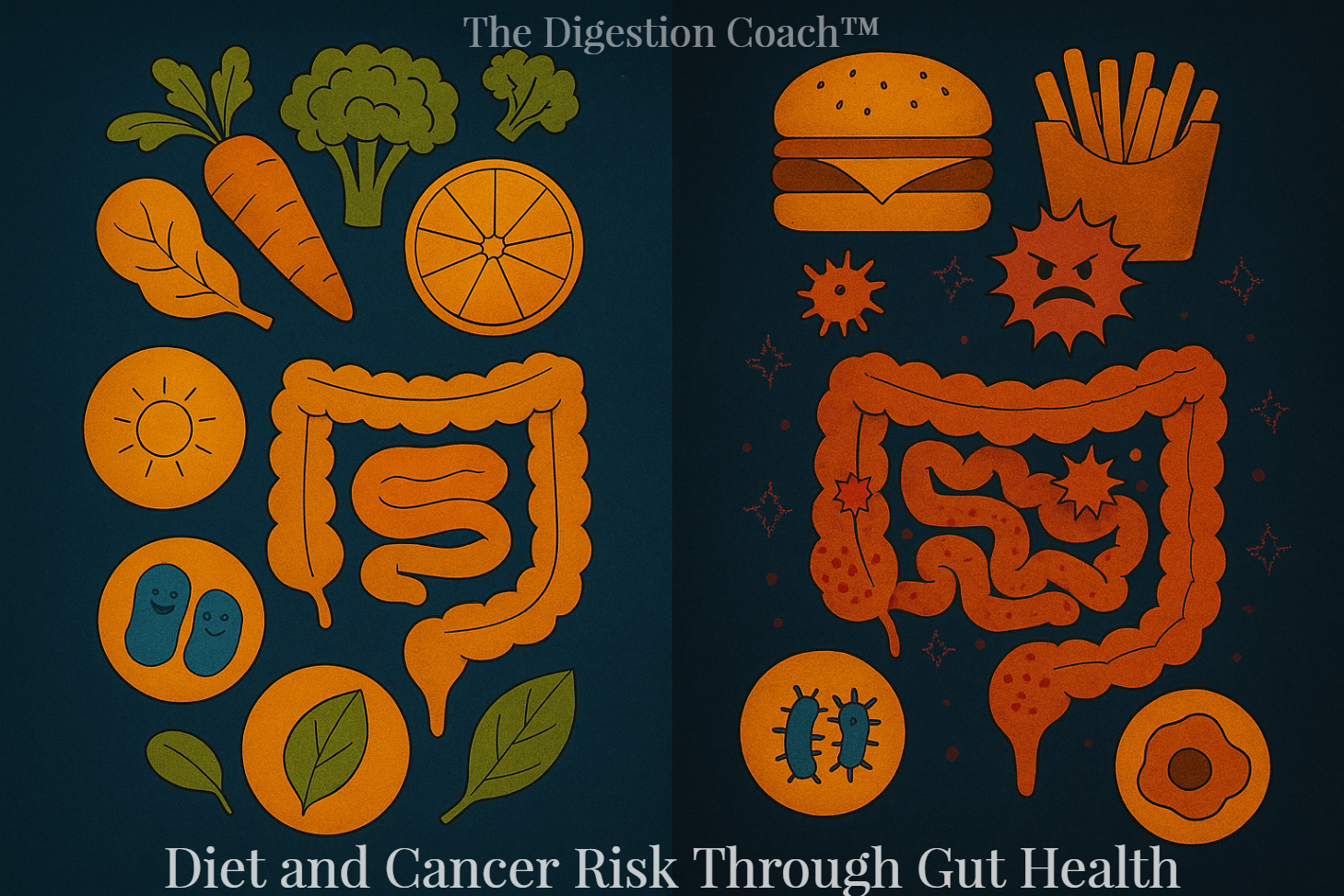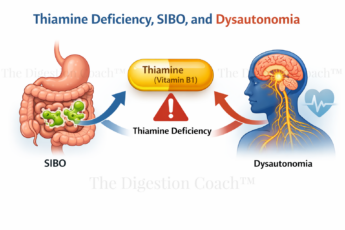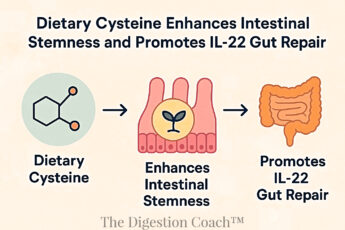How Diet and Cancer Link Through Gut Health: Fight Back with Food
A Hidden Risk in Everyday Foods
Foods like eggs, red meat, and nuts have fueled us with choline and tryptophan for centuries. Research suggests their metabolites—trimethylamine N-oxide (TMAO) and indole-3-acetic acid—may increase tumor growth in imbalanced guts. Modern lifestyles disrupt gut microbiome balance, turning once-harmless nutrients into potential threats. Fortunately, prebiotics and fermented foods can restore balance, reducing diet and cancer risks. Let’s dive into how to fight back with food.
The Science: How Gut Health Ties Diet to Cancer
Choline (in eggs and meat) and tryptophan (in turkey and nuts) feed gut bacteria, producing TMAO and indole-3-acetic acid. TMAO, linked to colorectal and breast cancer, can fuel tumors by boosting blood vessel growth, especially if your gut bacteria are out of sync. Indole-3-acetic acid, tied to tryptophan, affects immunity through a protein called the aryl hydrocarbon receptor, with mixed effects on cancer risk. When microbiome balance falters, these metabolites raise diet and cancer risks.
Why Modern Life Disrupts Microbiome Balance
Why do choline-rich foods raise diet and cancer concerns now, unlike in ancient times? Modern habits disrupt gut health:
- Gut Health Shifts: Diets heavy on meat and low on fiber favor TMAO-producing bacteria, throwing off microbiome balance. Modern diets often provide <15g of fiber daily, half the recommended amount.
- Overload: Daily eggs and steak spike TMAO beyond historical levels.
- Inactivity: Sedentary living fuels inflammation, amplifying TMAO’s harm.
- Longevity: Longer lifespans increase exposure to dietary and environmental risks, giving cancer more time to develop.
- Toxins: Processed food additives and pesticides add risks our forebears dodged.
These shifts make diet and cancer a modern puzzle—solvable with smarter eating.
Can Prebiotics Restore Gut Health?
A diet rich in prebiotics and fermented foods can restore microbiome balance and cut diet and cancer risks. Fiber from onions and urad dal lowers TMAO by starving harmful bacteria. Sauerkraut’s probiotics shift tryptophan metabolism to safer, anti-inflammatory compounds. These foods produce short-chain fatty acids, calming inflammation and blocking tumor growth. Studies have found that prebiotics reduced TMAO levels in weeks. Start small, as high fiber may cause mild bloating initially. Other prebiotic sources, like bananas or asparagus, add variety. By boosting gut health, you can offset choline and tryptophan’s downsides.
Your Daily Gut Health Mix (478g)
Try this 478g mix, split across meals, to balance diet and cancer risks with microbiome balance:
-
- 50g Onions: Prebiotic inulin (1g fiber).
- 3g Garlic: One clove for flavor and oligosaccharides.
- 75g Sauerkraut: Probiotics and 2g fiber.
- 175g Urad Dal: A fiber-rich black lentil common in Indian cuisine, with resistant starch (10-12g fiber). Recipes
- 100g Pumpkin Puree: Pectin (3g fiber). Pumpkin Pie Organic Non-Fat Greek Yogurt
- 75g Hummus: Chickpea power (4-5g fiber).
These foods provide inulin, oligosaccharides, resistant starch, and pectin, diverse fibers that feed beneficial gut bacteria. This fiber blend reduces inflammation, lowers TMAO, and supports microbiome balance for cancer prevention.
Total: ~20-23g fiber. Make a 20-minute stew with dal, garlic, and onions; pair with pumpkin and hummus; top with sauerkraut. For a gut health boost, split the stew across meals—e.g., dal for lunch, hummus as a snack.
Does It Work for Microbiome Balance?
Your gut is unique, so results vary. Aim for 20-30g fiber daily, per health guidelines, to shift microbiome balance within weeks. Track changes like reduced bloating or better digestion to gauge progress. It’s not a cure, but it’s a science-backed way to ease diet and cancer concerns. Consistency matters—make it a habit. What’s your go-to gut health food? Share below!
Conclusion: Take Charge of Your Gut Health
Choline and tryptophan aren’t foes; modern life just tips their scales. With prebiotics and probiotics, you can reclaim gut health and tackle diet and cancer risks. Start with this mix and share it with loved ones to fight diet-related cancer risks together. How do you support your gut health daily?
FAQ: Diet, Gut Health, and Cancer Prevention
1. Can I still eat eggs and meat safely?
Yes, eggs and meat are nutritious, but moderation is key. Research links high choline intake (e.g., multiple eggs daily) to elevated TMAO, which may increase colorectal cancer risk. Balance them with fiber-rich foods like those in the 478g mix. For example, pair eggs with spinach or lentils to boost gut health. Limit red meat to 1-2 servings weekly, per cancer prevention guidelines, to reduce TMAO production.
2. What other foods lower TMAO levels?
Beyond onions and urad dal, foods like oats, apples, and flaxseeds are rich in prebiotics that starve TMAO-producing bacteria. Olive oil and red wine (in moderation) may also suppress TMAO. Incorporate these into meals—e.g., oatmeal with apples for breakfast—to support microbiome balance and ease diet and cancer concerns.
3. How quickly can I improve my gut health?
Dietary changes can shift your microbiome in 1-2 weeks, but lasting balance takes 1-3 months of consistent high-fiber eating. Research has shown that 25g of daily fiber reduced TMAO in 4 weeks. Start with 10g extra fiber daily (e.g., an apple and a serving of beans) and scale up to avoid bloating. Track digestion improvements to stay motivated.
4. Are supplements as good as prebiotic foods?
Whole foods like garlic and sauerkraut outperform supplements because they deliver diverse fibers and probiotics. Inulin supplements may help, but they lack the full nutrient profile of onions or urad dal. Research has also found that whole-food prebiotics worked better at reducing inflammation than their supplement counterpart. If using supplements, pair them with a varied diet.
5. Can gut health changes prevent all cancers?
No, gut health is one piece of the puzzle. While a balanced microbiome lowers risks for colorectal and breast cancer by reducing TMAO and inflammation, genetics, lifestyle, and environmental factors also matter. Per WHO guidelines, combine the 478g mix with exercise, limited alcohol, and no smoking for broader cancer prevention.
This FAQ aims to empower you with practical gut health tips for cancer prevention. Do you have more questions? Comment below!










